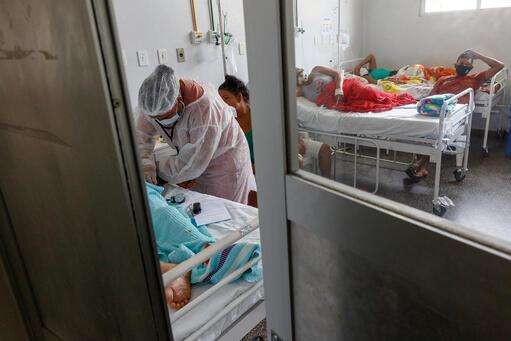By Ana de Lemos, Executive Director, Doctors Without Borders/Médecins Sans Frontières (MSF) Brazil
Even for an organization like MSF, for which combating epidemics is a central task, the COVID-19 pandemic has posed an unprecedented challenge.
Over the past year, MSF has responded to the unceasing demand for medical supplies and human resources, continuing to work in the places where the needs are most urgent. In April 2020, we began our COVID-19 response in Brazil, as the needs of vulnerable communities quickly became clear. Since then, we have put in place our largest response since MSF began providing medical services in Brazil in the early 1990s.
Hundreds of MSF staff have been involved in treating patients with COVID-19 in Brazil. Many of them are Brazilians with a great deal of international experience in MSF projects, who, for the first time, have been asked to respond to a crisis in their own country.
We have worked in several Brazilian states, assisting homeless people, migrants, indigenous communities, and people in prisons. In the north of the country, we supported the local health systems in Amazonas and Roraima states, and have just started a project in Rondonia to mitigate the impacts of COVID-19.
“We are facing an epidemic that is out of control”
I have to admit, however, that the challenge Brazil faces today—and will continue to face for at least the next few weeks—is simply unprecedented. In March 2020, when we had fewer than 300 COVID-19 deaths and about 6,000 cases in total, the numbers already seemed extremely worrying. Now, as our average daily rates surpass 2,000 deaths and more than 70,000 new infections, we see a very bleak picture. We are facing an epidemic that is out of control, with health systems in most Brazilian states on the verge of collapse or already lying in ruin.
Therefore, it is worth reflecting on how we got here. Brazil is today the epicenter of the global COVID-19 pandemic, with the highest number of daily deaths. While we represent about 3 percent of the world’s population, we currently account for about 15 percent of all new cases. It is obvious that this could have been avoided.
Since the beginning of the pandemic, there has been a lack of clear and cohesive direction from the authorities with regard to social distancing, lockdowns, the use of masks, and even vaccinations. Too often, messages from public officials have discouraged people from using masks or getting vaccinated. The authorities invested public resources to promote treatments that were not effective against the disease.
MSF’s experience in previous epidemics has taught us that difficult but necessary measures are most easily accepted and adopted when they are introduced to people in a clear and cohesive manner. It may seem obvious, but what’s obvious bears repeating in this moment: Overcoming the pandemic and reducing its social and economic impact will only be possible with solidarity and actions taken by the whole society.
We recognize the essential value and role of the Brazilian public health system in responding to this health crisis. In the places where we work together, we have seen the excellent work of health professionals, but we know that the system is being pushed to its absolute limit. The excessive workload has left many health professionals of all specialties with mental health problems.
“Now is high time to act”
Even in the face of such a difficult situation, we believe that there are ways to reduce the cost of human lives that we are paying during the pandemic.
The health authorities can improve testing practices by adopting PCR tests on a larger scale or, in their absence, rapid antigen tests. These tests detect whether the person has the virus and, with this information, it is possible to efficiently isolate them. Rapid antibody tests, widely used in Brazil, are not suitable in many cases because a person can test positive and no longer have the active virus.
The vaccination program unfortunately had a slow start and we do not know when a considerable part of the population will be immunized. As such, it is essential that we maintain proper hygiene, social distancing, and the use of masks, actions that depend on the engagement of each and every one of us.

In addition to those actions, Brazil must immediately adopt collective measures that reduce the movement of people, while guaranteeing that vulnerable groups have the basic means of subsistence in compensation for the interruption of their economic activities.
In this way, we will reduce the spread of the virus. If the contagion is not reduced, it will certainly cause an increase in the number of patients with COVID-19 in a short span of time, which will further tax an already overwhelmed health system.
That is why, more than ever, we must unite behind the necessary measures to avoid an even greater escalation in the number of cases and deaths that can happen in a few weeks. As a medical organization, it is our duty to speak out about the deaths that can be avoided. Everyone—both individuals and those with public power—has no more time to waste. Now is high time to act.





